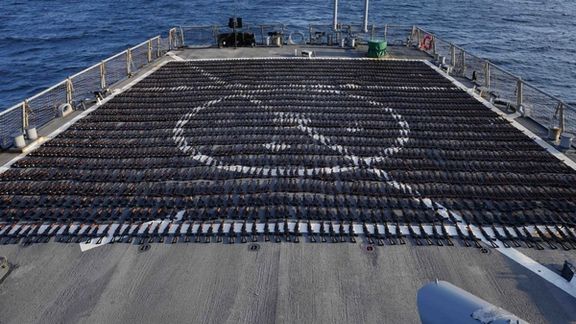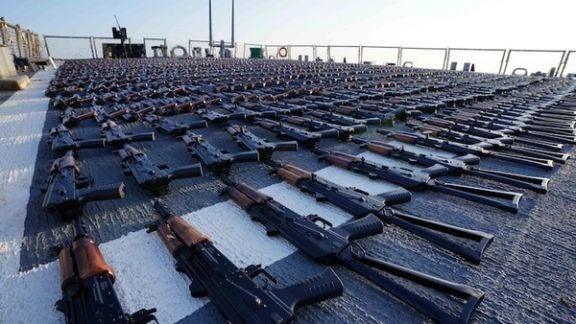US Files Forfeiture For Iranian Ammunition Seized By Navy

The United States has filed a forfeiture complaint over one million rounds of ammunition and other materiel seized by the US Navy in December during transit on the high seas.

The United States has filed a forfeiture complaint over one million rounds of ammunition and other materiel seized by the US Navy in December during transit on the high seas.
The Justice Department announced Friday that in addition to the rifle and machinegun ammunition, the Navy also seized thousands of proximity fuses for rocket-propelled grenades and thousands of pounds of propellent, disrupting “a major operation by Iran’s Islamic Revolutionary Guard Corps (IRGC) to smuggle weapons of war into the hands” of Iran-backed Houthis in Yemen.
Both the US and British navies have seized weapons and ammunition in recent months enroute to Yemen in Gulf of Oman or the Arabian Sea.
Iran has been rendering military and financial support to the Houthis who overthrew Yemen’s government in 2014 and have continued to fight a Saudi-led coalition that backs the internationally recognized government.
“The Justice Department is now seeking the forfeiture of those weapons, including over one million rounds of ammunition and thousands of proximity fuses for rocket-propelled grenades,” Attorney General Merrick B. Garland was quoted as saying in the statement. “The Justice Department will be relentless in holding accountable those who break our laws and threaten our national security.”

The Biden Administration has adopted a tougher stance toward the Iranian regime since September after long-running nuclear talks reached a deadlock in what the US says was unreasonable demands by Tehran.
A deadly crackdown on protests by the regime that killed more than 500 civilians and delivery of killer drones to Russia that have been used against civilian targets, have also played a role in shaping Washington’s tougher position.
“This forfeiture action prevents ammunition and dangerous weapons from falling into the wrong hands and highlights the importance of our investigative work to deny criminal and terrorist networks their instruments of violence and destruction,” said Secretary of Homeland Security Alejandro N. Mayorkas. “I am extremely proud of the critical investigative role played by Homeland Security Investigations alongside our law enforcement and Department of Defense partners in a collaborative whole-of-government effort.”
It is not clear what practical difference the forfeiture would make in this case after the weapons were seized from an un-flagged vessel with no proper documentation to carry weapons in international waters. With no clear owner of the goods, there would be no legal party to claim the cargo.
“This forfeiture action aims to stop in its tracks yet another attempt by Iran’s Islamic Revolutionary Guard Corps and its proxies to fuel violence and conflict around the globe,” US Attorney Matthew M. Graves for the District of Columbia said. “The US Attorney’s Office for the District of Columbia will use all our tools, including our jurisdiction to seize and forfeit assets, located abroad, to disrupt the IRGC’s efforts to sow discord.”
Iran and Saudi Arabia, the two main foreign parties to the conflict in Yemen, sign a deal March 10 to restore diplomatic ties. Analysts believe that Riyadh’s main goal for the agreement is to end the conflict and focus on its economic progress.
However, this would take further negotiations and it is not clear to what extent the Iranian regime is willing to compromise, without making more demands, such as economic benefits from any cooperation.
Iran also ships weapons to its allies and militant proxies in Syria and Lebanon. Israel has been conducting air and missile strikes on Iranian warehouses and weapons shipments since 2017, to deny the arming of hostile forces.